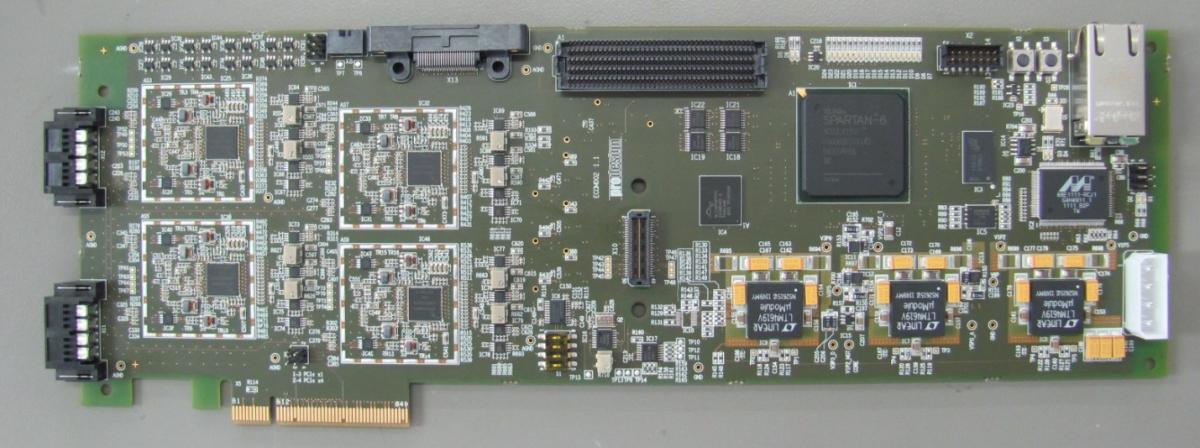EXPRESSMIMO2
The newest platform which can target OAI software was given the code name ExpressMIMO2 since it follows its predecessor ExpressMIMO. The key target for ExpressMIMO2 was to reduce its cost so as to make it accessible for other laboratories wanting to experiment with OAI using a reasonable number of nodes (i.e. normally greater than 2). The board was designed to allow for stand-alone operation at low-power levels (maximum 0 dBm transmit power per channel) simply by connecting an antenna to the board. The chosen RF technology covers a very large part of the available RF spectrum (250 MHz-3.8 GHz) with channels up to 20 MHz bandwidth. ExpressMIMO2 is designed to be used with off-the-shelf PCs running standard Linux distributions and potentially a real-time extension (RTAI/Xenomai or PREMPT-RT) in order to make use of open-source development tools and open-source networking tool suites and applications, both stable and experimental. EURECOM has successfully tested the board with regular laptops through a readily-available (and cheap) conversion cable in order to connect through the ExpressCard slot which also uses PCIexpress technology. Today OAI supports RTAI but the other options may become available for ExpressMIMO2, as a function of partners‘ and projects’ interest. The PCIexpress bus interface allows existing drivers from its predecessors (CBMIMO1 and ExpressMIMO) to be used as is. Similarly the OAI OCTAVE interfaces for non-real time experiments can also be used with changes only related to configuration of the new RF components. EURECOM will provide information to partners in the Network of Excellence wishing to acquire such equipment.

ExpressMIMO2 motherboard characteristics
The board is built around a low-cost Spartan-6 FPGA (150LXT) with native PCIexpress on the FPGA fabric and coupled with 4 high-performance LTE RF ASICs on-board, manufactured by Lime Micro Systems (LMS6002D). The combination allows for four 20 MHz full-duplex or half-duplex radios to be interfaced with a desktop or laptop PC without the need for external RF. External RF is, however, required if high power output, antenna duplexing or standard-compliant channel filtering are required.
The embedded system on the ExpressMIMO2 is based on a LEON3 microcontroller. In the current design the LEON3 and the on-chip bus are clocked at 61.44 MHz which is sufficient for the throughput of the 1-way PCIe bus (62.5 MHz 32-bit). The embedded system is augmented by a data-acquisition and framing unit which interfaces with the 4 LMS6002D and controls both the sample input-output and the serial programming busses (SPI) for RF and sampling configuration parameters. The LEON3 has a large DDR3 memory for data and program storage. An on-board Ethernet PHY is also provided, although it is currently not used.
The embedded software for the FPGA is booted via the PC or can reside entirely in the boot ROM which is part of the FPGA design. The current software, however, is booted by PCIexpress dynamically under control of the PC device driver. A typical application, therefore, is a combination of PC software dialoguing with the card via driver configuration of shared PCI memory space and a program in the local memory on the embedded system. This program can be dynamically loaded from the PC.
The basic design does not include any on-FPGA signal processing and consumes approximately 10-15% of the FPGA resources. There is significant room left for additional processing on the FPGA, for instance Xilinx FFT processors or turbo-decoders to offload some processing from the host PC if required.
Key facts of the board :
- Real time, with processing split between the SPARTAN6 and the PC, MIMO 4*4 : LTE-A compliant , FDD and TDD
- Frequency range : 250 MHz to 3,8 GHz, max bandwidth 28 MHz
- The transceivers are controlled individually => MIMO 4*4, MIMO 2*2 on one band and MIMO 2*2 on another band, …
- The system supports a feedback loop in order to support Dirty RF mechanisms (DPD, IQ balance, LO leakage compensation).
This card has been designed with the collaboration of Prodesign Europe and Insight SIP.
How to purchase EXPRESSMIMO2
TELMAT (www.telmat.com) is the official distributor of EXPRESSMIMO2. To purchase it, please contact José RUIZ (jose [dot] ruiz [at] telmat [dot] fr, +33 6 72 80 45 45)

